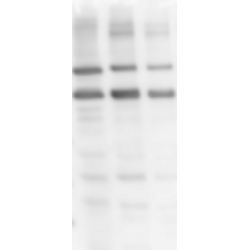Anti-AKAP4 (clone 7E10) - 20 µg
Référence : 4BDX-1602S
L'anticorps monoclonal de souris clone 7E10 reconnait la région carboxy-terminal de la protéine d'ancrage A-Kinase 4 (AKAP4) et il fonctionne en Western Blot, en Immunohistochimie, en ELISA, en Microscopie électronique, en Cytométrie en flux et en Immunofluorescence.
Fiche technique
Applications |
Western Blot , Immunohistochimie, Immunofluorescence, Microscopie électronique, Cytométrie en flux |
Réactivité |
Humain, Cheval, Taureau, Souris, Rat |
Conservation |
+4°C / -20°C |
Quantité |
20 µL |
En savoir plus
L'anticorps monoclonal de souris clone 7E10 reconnait la région carboxy-terminal de la protéine d'ancrage A-Kinase 4 (AKAP4). Cet anticorps fonctionne en Western Blot, en Immunohistochimie, en ELISA, en microscopie électronique, en Cytométrie en flux et en Immunofluorescence.
Cet anticorps monoclonal a été produit à partir d'un hybridome de souris issu d'une souris immunisée avec un peptide couvrant l'extrémité C-terminale de la séquence de la protéine AKAP4 humaine (Uniprot ref Q5JQC9). Il est homologue à 90% entre les mammifères.
Il est déterminé par sa capacité à reconnaître l'extrémité C-termina de la protéine humaine AKAP4. L'anticorps monoclonal (clone 7E10) reconnaît à la fois la pro-AKAP4 (110 kDa / 854 AA) et l'AKAP4 (82 kDa / 665 AA) mais ne réagit pas avec le prodomain (21 kDa).
Exemples d'utilisation :
Scovell JM, Bournat JC, Szafran AT, Solis M, Moore J, Rivera A, Chen CH, Zhang J, Wilken N, Seth A, Jorgez CJ (2021) PRSS50 is a testis protease responsible for proper sperm tail formation and function. Development Vol.148 (8): dev197558.
Carracedo S, Briand-Amirat L, Dordas-Perpinyà M, Ramos Escuredo Y, Delcombel R, Sergeant N and Delehedde M (2022) ProAKAP4 protein marker: towards a functional approach to male fertility. Animal Reproduction Science. Vol.247(107074):1-20.https://doi.org/10.1016/j.anireprosci.2022.107074
Liste complète de toutes les publications utilisant les produits sur simple demande à : contact@4biodx.com
Produit destiné uniquement à la Recherche (Research Use Only Product). Non destiné à des applications diagnostiques ou thérapeutiques.
Plus d'informations sur l'AKAP4
La protéine AKAP4 (A-Kinase Anchor Protein 4) est une protéique spécifique du spermatozoide qui appartient à la famille des protéines d'ancrage de l'A-kinase (AKAP) et elle possède donc un site de liaison à la sous-unité régulatrice de la protéine kinase A (PKA). L’AKAP4 est également décrite comme une protéine CTA (Cancer Testis Antigen), c’est-à-dire dont l’expression apparait dans certains types de tumeurs (dont le cancer de la prostate et du poumon).
Le gène de l’AKAP4 humaine est situé sur le chromosome X et code une protéine de 854 acides aminés localisée dans la gaine fibreuse du spermatozoïde. L’AKAP4 joue un rôle majeur dans la motilité du spermatozoïde chez les mammifères. AKAP4 est également nommé AKAP-4, AKAP82 (A-Kinase Anchor Protein 82 KDa), PRKA4 (Protein Kinase A Anchoring Protein 4), HI, CT99 (Cancer/Testis Antigen 99), FSC1 (Fibrous sheath component 1) or P82.
Chez l'Homme, une downregulation de l'AKAP4 a été observée chez les patients non fertiles dont les paramètres spermatiques sont normaux (Frapsauce et al. 2014).
Chez le taureau, une uprégulation de l'AKAP4 a été décrite chez les taureaux hyperfertiles en comparaison d'animaux hypofertiles (Peddinti et al. 2008).
L'anticorps monoclonal de souris clone 7E10 reconnait la région carboxy-terminal de la protéine d'ancrage A-Kinase 4 (AKAP4) et il fonctionne en Western Blot, Immunohistochimie, ELISA, Microscopie électronique et en Immunofluorescence.
More references on AKAP4 antibodies and application protocols:
Carracedo S, Briand-Amirat L, Dordas-Perpinyà M, Ramos Escuredo Y, Delcombel R, Sergeant N and Delehedde M (2022) ProAKAP4 protein marker: towards a functional approach to male fertility. Animal Reproduction Science. Vol.247(107074):1-20.https://doi.org/10.1016/j.anireprosci.2022.107074
Scovell JM, Bournat JC, Szafran AT, Solis M, Moore J, Rivera A, Chen CH, Zhang J, Wilken N, Seth A, Jorgez CJ (2021) PRSS50 is a testis protease responsible for proper sperm tail formation and function. Development Vol.148 (8): dev197558.
Griffin R, Swegen A, Baker M, John Aitken R, A Skerrett-Byrne D, Silva Rodriguez A, E Martín-Cano F, Nixon B, J Peña F, Delehedde M, Sergeant N and Gibb Z (2020) Mass spectrometry reveals distinct proteomic profiles in high- and low-quality stallion spermatozoa. Reproduction. 160(5):695-707.
Carracedo S, Loyens A, Eddarkaoui S, Serteyn D, Malo C, Skidmore L, Briand-Amirat L, Barbotin AL, Maurage CA, Delehedde M and Sergeant N (2020) The sperm specific proAKAP4 polypeptide exhibited conserved functions, localizations and metabolism among mammals. Animal Reproduction Science. Vol. 220 :106448 - P88 https://www.sciencedirect.com/science/article/abs/pii/S0378432020303201
Delehedde M, Carracedo S, Duchene B, Demouveaux B, Remy G, Kervoaze G, Aubry S, Gevaert MH, Maurage CA, Jonckheere N, Van Seuningen I, Philippe Gosset G, Desseyn JL, Sergeant N and Pichavant M (2020) Cigarette smoking affects the sperm-specific proAKAP4 concentrations and impairs both spermatogenesis and sperm quality. Andrology. Vol. 8 (Suppl. 1):45-46.
Langlade C, Buff S, Dias C, Commin L (2020) Assessment of Optimized Frozen/Thawed Semen Samples in Canines with the New A-Kinase Anchor Protein 4 Precursor Biomarker. Biopreserv Biobank. 18(5):409-414.
Riesco M, Anel-Lopez L, Neila-Montero M, Palacin-Martinez C, Montes-Garrido R, Alvarez M, de Paz P, Anel L (2020) ProAKAP4 as Novel Molecular Marker of Sperm Quality in Ram: An Integrative Study in Fresh, Cooled and Cryopreserved Sperm. Biomolecules. 10(7):1046. doi: 10.3390/biom10071046.
Ruelle I, Sergeant N, Bencharif D, Charreaux F, Thorin C, Michaud S, Dordas-Perpinyà M, Jouy N, Audry S, Maurage CA, Delehedde M and Briand-Amirat L (2020) ProAKAP4 concentrations in semen as a predictive tool of bull fertility: A preliminary study. Reproduction, Fertility and Development. 32(1):145.
Sergeant N, Blommaert D, Carracedo S, Franck T, Lejeune JP, Gevaert MH, Aubry S, Maurage CA, Serteyn D and Delehedde M (2020) Assessment of the proAKAP4 concentrations as a pertinent sperm parameter to select extenders and preservatives of stallion semen. Animal Reproduction Science. Vol. 220 :106449. P89. https://www.sciencedirect.com/science/article/abs/pii/S0378432020303213#!
Sergeant N, Carracedo S, Blommaert D, Aubry S, Jouy N, Lejeune JP, Franck T, Maurage CA, Serteyn D, Buée L and Delehedde M (2020) Proteolysis of proAKAP4 in semen as a regulatory sensor of sperm quality and functionality. Andrology. Vol. 8 (Suppl. 1):44-45.
Blommaert D, Franck T, Lejeune JF, Selleslagh M, Jouy N, Sergeant N, Serteyn D and Delehedde M (2019b) The Horse 4MID® Kit as a promising tool to compare different freezing media to preserve stallion semen. Rev. Bras. Reprod. Anim. Vol 43(2):585.
Blommaert D, Sergeant N, Delehedde M, Jouy N, Mitchell V, Franck T, Donnay I, Lejeune JP and Serteyn D (2019b) Expression, localization, and concentration of A-kinase anchor protein 4 (AKAP4) and its precursor (proAKAP4) in equine semen: promising marker correlated to the total and progressive motility in thawed spermatozoa. Theriogenology. Vol. 131:52-60.
Delehedde M, Carracedo S, Selleslagh M, Eddarkaoui S, Amirat-Briand L and Sergeant N (2019) ProAKAP4 polypeptide as a biomarker of sperm functionality and male fertility disorders. Int J Gynecol and Reprod Sci. Vol. 2(1):13-19.
Delehedde M, Demouveaux B, Remy G, Selleslagh M, Dewulf Q, Desseyn JL, Moreau M, Gosset P, Muriel Pichavant M and Sergeant N (2019a) ProAKAP4 concentrations as an indicator of good spermatogenesis and sperm quality under oxidative stress conditions. Andrology. Vol. 7(1):86.



